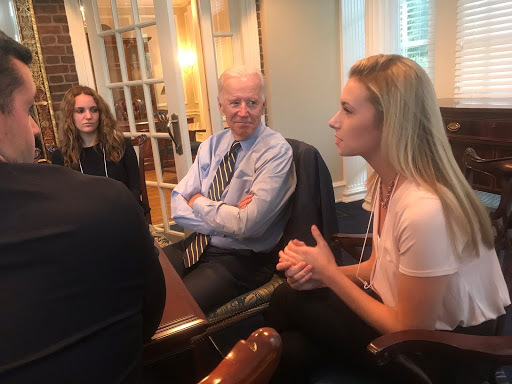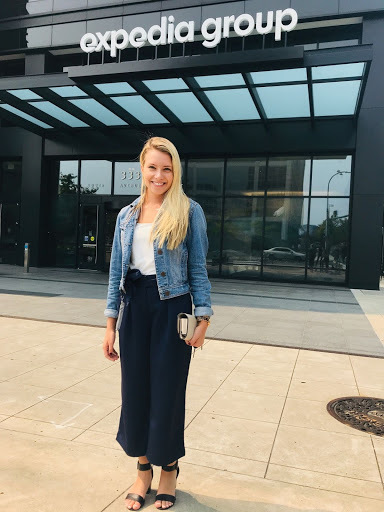Learning by Doing
UD alumna pursues a passion for politics
By Laura Matusheski, University of Delaware junior and intern for the University of Delaware’s Center for Political Communication
FEBRUARY 11, 2021″Coming into college, University of Delaware alumna Sarah Fritz (AS18) didn’t “get? politics. “I’m somebody who likes to understand how things work and I didn’t like that I didn’t understand how the political process worked.” Fritz decided to major in political science. She took courses in political theory, philosophy, and history, which became the highlights of her college career. She was also involved in numerous registered student organizations, including the American Mock Trial Association, UDance, Phi Alpha Delta (pre-law fraternity), and Project Sunshine. Fritz credits UD’s National Agenda course and speaker series for solidifying her passion for politics.

For the past ten years, National Agenda has succeeded in producing memorable and intellectual events for students, alumni, guest speakers, and the UD community. Professor Lindsay Hoffman, who was entrusted with the program by founder Ralph Begleiter in 2015, has worked hard to create a curriculum and bond for students that lasts far past the fall semester.
Fritz took the National Agenda course in 2017 during the fall semester of her senior year. For that year’s theme of “As We Stand | Divided,” guest speakers addressed the many seemingly insurmountable social and ideological gaps facing Americans. Fritz recalled one distinguished guest who joined the series on October 17“former Vice President Joe Biden, now the 46th president of the United States. Following the public event, President Biden met privately with the students for UDairy ice cream and a three hour-long discussion about a variety of political topics, including women’s issues and the Violence Against Women Act, which Biden co-sponsored as U.S. Senator in 1994. “Not many people can say they”ve spent three hours talking to Joe Biden, and I have,” Fritz said. “It was such a great experience to be able to be that up close and personal with a politician of his stature.”
Fritz fondly remembers another speaker, Appalachian author David Joy, who spoke to her National Agenda class about geographical divides in the United States. It was insightful to understand what life is like for a southerner living in a rural and low-income area, said Fritz. “It was a great example of not generalizing people based on where they’re from, or their experiences because [Joy] came in there and was the complete opposite of what I thought he was going to be.”
Apart from the speaker series, Fritz found the in-class portion of the course, taught by Hoffman, to be a safe space where students could engage in civil discourse over the most pressing political issues. “To foster an environment where everybody feels comfortable to speak, but also comfortable to listen, there needs to be a tone of vulnerability,” she said. “I think vulnerability is really hard, but vulnerability and empathy are required to be able to hear somebody else’s side but also to share your own. And I think that Dr. Hoffman was really great at setting that tone.” Fritz also commended Hoffman for objectively moderating classroom discussions. “She was masterful at being able to guide the conversation so that everybody felt heard.”

Fritz struggled with confidence early on during her time as an undergraduate student and experienced an “imposter syndrome, feeling like everyone’s going to find out that you don’t know what you’re doing or talking about.” To curb that feeling, she advised college students to follow their passions with a mind open to possibilities. “At the end of the day, the only way to learn about something you don’t know how to do is to do it.” Fritz said. “Say yes to it. Even if you don’t have all the information, or even if you don’t know what you’re doing.”
Fritz graduated from the University of Delaware in 2018 with a degree in media communications and political science and a minor in legal studies. She is currently pursuing a master’s degree in public policy at The George Washington University and was recently selected to be one of the women’s leadership fellows within the program. Proclaiming herself to be a “political nerd,” she listens to podcasts such as Pod Save America, The Daily and The Journal almost every day.
Along with being a part-time graduate student, Fritz works as a government affairs coordinator for Expedia Group. In the months leading up to Election Day, Fritz and her colleagues launched “Expedians Vote 2020,” a civic engagement campaign designed to educate and inform US-based employees, particularly first-time voters. Their online civic action center drew significant traffic and engagement.
“It’s exciting from a data perspective how much I personally am able to move the needle by directing this program for Expedia employees.” she said.
More than 1,000 employees attended a “Power of the Ballot? panel discussion, organized by her team and hosted by CEO Peter Kern. They organized a poll worker volunteer recruitment drive, and employees received time off to vote or volunteer on Election Day. Fritz also served as a poll worker in the Washington D.C. area in November.
“I think it’s easy, coming from my walk of life to judge people who might not vote,” she said. “But what I’ve learned from this experience of running this Get Out the Vote campaign is a lot of people just don’t have an interest in politics. They don’t understand it, and they don’t think that it impacts their day-to-day life. And therefore, voting isn’t important to them. What I’m trying to do now is just make voting accessible to the people within my immediate network.”
According to Fritz, it is not a question of whether the new U.S. president can do his or her job at a national level, but whether communities can come together to form grassroots advocacy groups. “We can see how much the local government has a say over the criminal justice system and over the police department. As we’ve seen with the Black Lives Matter movement, state and local elections do matter.” Fritz said.
Moving forward, Fritz said she is “cautiously optimistic? about what the future holds. “I hope that, regardless of what happens, our country is going to start to focus on the issues that impact people the most.” she said.
